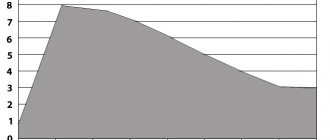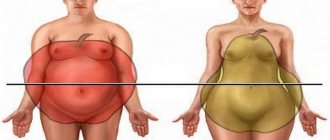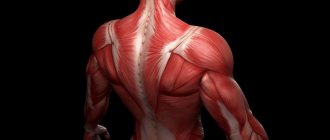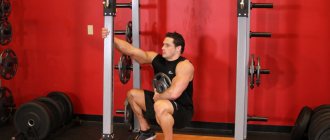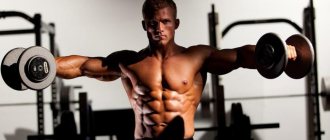For most gym goers, working out is a great way to relax, take your mind off worries and get a boost of energy.
But what to do if this vacation turns into dizziness, nausea and other unpleasant symptoms? What kind of pleasure can we talk about in this case?
Is it time to think about giving up training?!
But don't rush to conclusions! Have you ever heard of bodybuilders who considered a workout ineffective unless they vomited a couple of times during the process?
This is certainly not our case, but there’s really no need to panic.
Practice shows that unpleasant symptoms of nausea and dizziness often plague people who are passionate about fitness, especially in the first months of visiting the gym.
What is the reason for this reaction of the body, and is there a way to cope with these troubles?
In this article we will find the answer to this important question.
A sharp increase in loads.
If you miscalculate your strength and take too much weight, you may well feel dizzy.
There have been cases when people lost consciousness from severe overexertion.
Therefore, you should not chase quick results.
Start doing sets with lighter weights, gradually increasing the load until it is acceptable.
What to do if you feel dizzy during exercise
Each person’s reaction to something is different, someone can train with high intensity and not feel discomfort, and for others, even the slightest load can cause many ailments, so in no case be guided by the training regimen of professional athletes, since they have better training than a beginner.
If you think that most often women experience dizziness during sports, this is not so. A malfunction in the body can occur regardless of gender.
We will learn further how to avoid dizziness during training and what causes it.
Why do you feel dizzy during exercise? Causes
There are many causes of dizziness during exercise, but some of the most common are:
1. A sharp increase in load. If you have not exercised for a long time, and when you came to the gym, you overestimated your capabilities, then the appearance of dizziness is not surprising. Therefore, always start your workout small and gradually increase the load. You shouldn’t chase quick results, everything will come anyway, the main thing is time!
2. Insufficient air in the room. During physical exercise, the body warms up intensely, and if you also exercise in a place where there is insufficient oxygen, this is a double blow for the body, so dizziness and nausea occur. In this regard, always make sure that the room is fresh and cool, and if you are working out at home, open the windows or turn on the air conditioning.
3. Dehydration. During intense training, a person loses a lot of fluid through sweating, so he needs to replenish the loss. If many people say that drinking during classes is prohibited, this is not so. Drinking water will not add fat to your body; on the contrary, it is simply necessary to avoid dizziness.
4. Lack of proper nutrition. Often, many people are so eager to lose weight that they stop eating properly, and in addition to this, they exercise diligently, and as a result they feel unwell. Therefore, a mandatory point in achieving what you want is proper, five meals a day plus exercise.
5. Did not wait until after eating. If you ate and 15 minutes later went to work out, then it is not surprising that a feeling of nausea and dizziness appeared. After eating, at least 1.5 hours should pass, only then can you perform exercises.
6. Taking any medications before training, such as antibiotics or sedatives.
7. Overheating of the body due to improper clothing. In no case should you wear things made of poorly breathable fabric to classes, and also don’t put a lot of them on yourself in order to burn fat faster, this can lead to dizziness.
8. Due to any diseases, for example, low/high blood pressure, hyponatremia, low blood sugar, heart problems, etc., so before you start training, get examined by a specialist.
Important: if you feel severe dizziness and nausea, do not continue doing the exercises under any circumstances. you need to go to the place where more air is coming in, sit down and throw your head back so that blood flows to the brain
Drink cold water, rinse your face and ears with it, it will become much easier. If you don’t have the strength to do all this on your own, contact any person or trainer, don’t be shy, there is nothing more important than health.
To the question: how to avoid dizziness and nausea during classes, there are two answers: firstly, it is necessary to identify the cause, and secondly, to avoid the 8 points listed above.
Good health is the main gift for every person, so treat it with care, this is the only way your gift will be preserved for many years!
Overtraining.
Another common problem for people who are chasing results.
Working hard and exceeding the amount of time spent in the gym, you may feel dizzy and darkened in your eyes.
For you, this should be a signal that your body is not able to withstand such intense training.
How to prevent it?
If dizziness is not a consequence of congenital pathologies or pressure surges, then to prevent it it is enough to follow simple rules.
https://youtu.be/IronzYbT0TM
- Follow the exercise technique. This is the main reason for feeling unwell after training.
- Before any heavy approach, take a warm-up. Gradually increasing the intensity of your training allows you to better control your condition and understand whether you are ready for a heavy approach.
- Watch your breathing carefully. If you hold your breath during heavy bench presses and deadlifts, this is a direct path to hypoxia, therefore, to dizziness and nausea.
- Don't let your body overheat. This is especially true for people whose blood pressure may drop due to stress.
- Drink plenty of water during your workout. Dehydration of the body during training disables all systems.
- Keep a training diary. It allows you to avoid excessive loads, incl. overtraining.
Lack of oxygen.
Very often, beginners who have recently started visiting the gym and are enthusiastically engaged in cardio training complain of dizziness and even loss of orientation in space.
The reason for this condition lies in both improper breathing and lack of stamina, which is typical for unprepared people.
Insufficient air. It is no secret that an athlete’s lungs pump increased volumes of oxygen.
But if you are training in a cramped basement, where there are a dozen other people “pulling iron” besides you, it is quite possible to experience all the “delights” of lack of air.
Is exercise allowed for dizziness?
When the first symptoms of dizziness occur, you must stop training, sit down or lie down. Once symptoms subside, reduce exercise weight and intensity. Over time, the body must adapt and bear the load more easily.
If dizziness occurs constantly, then you need to consult a doctor.
You need to play sports, over time the body will be trained and doing the exercises will become easier. Physical education will help improve blood circulation and strengthen the walls of blood vessels . You don't need to go to the gym every day. The optimal time is two to three times a week for an hour and a half.
Improvements will not come immediately; you need to get ready for long-term work. Under no circumstances should you train through force and pain. When choosing exercises, soberly assess your strength and health status.
It is better to give preference to slow load or moderate cardio training , and exclude workouts that do not require a break. For example, on a treadmill, choose the lowest incline angle and walk at a calm pace. You need to lift dumbbells at a moderate pace. Start with light weights.
Poor nutrition.
A person who comes to the gym with the specific goal of losing excess weight usually goes to extremes.
He not only begins to work out hard, but also goes on a strict diet.
As a result, strength exercises against a background of exhaustion of the body result in malaise, weakness, dizziness and other dangerous troubles.
Feeling dizzy and nauseous after training
Dizziness during training does not appear out of nowhere. There are always objective reasons for such a state. By getting to know them in more detail, you can avoid painful conditions and calmly play sports. The conditions under which the disease appears are divided into three main groups:
- excessive loads;
- incorrect tactics during sports;
- pathological conditions.
Each reason is discussed separately below.
There are several types of headaches that you can experience on the treadmill. Let's get acquainted with their signs:
- Localized pain in the facial area indicates the possible presence of sinusitis.
- Increasing pulling sensations in the occipital part indicate increased blood pressure.
- Violation of cranial pressure leads to acute pain, accompanied by vomiting.
- Compression of the artery leading to the brain provokes pain in the back of the head with minor movements, even during yoga. Fingers and limbs go numb.
When exercise in the gym brings discomfort, and attacks from the treadmill recur, you should definitely contact a medical facility. After making a diagnosis, the doctor will prescribe treatment.
Among the tablets for eliminating a dizzy and sore head, the most popular are:
- Medexol.
- Celecoxib.
- Vinpocetine.
- Vestibo.
If you want to refrain from drug therapy, folk advice will help:
- Having a small bottle of horsetail essential oil will help relieve pain when inhaled.
- Eating seasonal berries will relieve headaches and dizziness.
- A decoction of mint will relieve unpleasant symptoms.
- Yoga is great for relieving dizziness.
When after classes, you can’t continue training, exercise through force. This will only make things worse. Also, you should not resume training after a short rest. You can, on the contrary, give the body a rest and restore strength. If the dizziness was a one-time occurrence, it’s okay. It is repeated - you need to think seriously.
When you feel dizzy while running on a treadmill, you can fall and get seriously injured. To prevent this from happening, you need to learn the following:
- Before classes, you should warm up by doing the following exercises - swinging your arms, bending to the side, rotating your legs, squats.
- The speed limit must be increased gradually.
- You can only start and finish exercises with the treadmill completely stopped.
- If you feel unwell, it is better to grab the special handrails.
Malaise
But don't worry right away. This shouldn't necessarily be a cause for concern. Just think about which of the intense exercises you do you could eliminate to increase the amount of oxygen to your tissues.
The reasons may be purely physiological, and are not necessarily associated with any disease or serious problems.
You can make adjustments to the intensity of the exercises performed. If this does not help, then you should undergo an examination, especially if you have not had one for a long time.
Lack of energy
First of all, check whether you are taking any medications. Some pills can cause migraines by dilating or constricting blood vessels due to the extra strain. If you do not take any medications, there may be another cause of the headache.
Because the heart works at an accelerated rate, it pumps a much larger volume of blood than at rest. Because of this, the blood vessels dilate. But now you have finished the workout, your heart begins to beat at its normal rhythm, and the blood vessels cannot decrease in size as quickly. This may make you feel dizzy or nauseous.
- There should be at least 1.5-2 hours between meals and training.
- Preferably choose liquid and carbohydrate foods.
- You should not drink a lot of water before exercise (exclude carbonated drinks).
- During intense exercise, drink water in small sips (no more than 0.5 l), drink another 0.5 l within an hour after.
- When the first signs of dizziness and nausea occur, you should rest in the fresh air for a while.
Having a sporty attitude and working on yourself is good for the body. But any loads should be selected in accordance with physical capabilities, existing chronic diseases, and individual characteristics. The intensity of the load should increase gradually, which will allow the body to adapt to the changes that occur.
Causes of dizziness associated with diseases.
Low or high blood pressure.
Often, dizziness and darkening of the eyes during exercise occur in people with pathologically low blood pressure, as well as people suffering from asthma.
Heavy loads provoke a drop in pressure, which causes unpleasant symptoms.
The same misfortune can also occur in hypertensive patients.
Practice shows that strength training with axial loads is contraindicated for people with high blood pressure:
- Increased intracranial pressure. An increase in heart rate or excessive strain in people with this disease can result in headache, dizziness and even loss of consciousness. This category of people is allowed to exercise only with light weights.
- Osteochondrosis. Problems with the spine, especially in the cervical region, can cause weakness, cold sweats and dizziness with any load on the spinal column. Such people need to control the weight they lift so as not to overstrain their back. Even jumping rope can provoke discomfort in such people.
- Vegetative-vascular dystonia. Problems with the autonomic system can manifest as hand tremors, cold sweat, weakness and dizziness. To avoid unpleasant symptoms, avoid exercises in which you suddenly change your body position. Moreover, persons with VSD are contraindicated from performing elements in which the head is lower than the chest.
- Disorders of the vestibular apparatus. In the case of this disease, a person begins to feel dizzy when performing circular or back-and-forth movements, which causes motion sickness.
- Taking certain medications. Feeling unwell while working out at the gym can also be the result of taking certain medications, especially sedatives, antibiotics or vascular drugs.
Why do you feel dizzy during/before/after training and what to do?
Dizziness can strike at any time, which causes trouble and various problems. To get rid of the disease, you should immediately identify the main causes and, if necessary, begin effective treatment. When spatial orientation is lost during physical activity, the perception of surrounding objects becomes difficult.
Working out in the gym or at home is an excellent choice for maintaining tone, good physical shape, increasing endurance, etc.
But it is very important to choose the right set of exercises so as not to harm the body or overwork it.
During training, a person may suddenly experience discomfort in the form of headaches, dizziness, sometimes he feels nauseous, vomiting, and his general condition worsens. This phenomenon is typical for experienced athletes when they begin to train intensively, using a large number of muscles. But for newcomers to the sport, such manifestations cause serious concern and panic.
5 main reasons
- Lack of oxygen in the room and overheating.
To obtain the desired results from training and benefits for the body, oxygen is required. With insufficient intake, a person begins to experience dizziness.
Intense exercise causes increased sweating, but the thick fabric of workout clothes often disrupts the natural cooling mechanism.
This leads to the development of heat stroke, which is characterized by dizziness, nausea, vomiting, fever, and loss of consciousness.
With food, the human body receives a huge amount of useful substances and vitamins, so if you have a poor diet during sports, you feel dizzy, feel nauseous and vomit.
This is due to the depletion of internal energy reserves during physical exercise. But feeling unwell can also occur if you overeat immediately before training. The body spends its “force” not on supplying the muscles with oxygen, but on digesting food.
A person involved in sports or heavy physical activity loses a huge amount of moisture through sweating. As a result, nausea, clouding in the head appears, and the natural process of emptying the stomach slows down.
- A sharp surge of adrenaline.
Positive and negative results of exercise have an impact on a person’s mood. Excessive expression of emotions leads to an increase in the amount of adrenaline in the blood, which causes vasospasm. This is what causes dizziness and pain.
Some groups of medications also negatively affect the condition of a person who decides to play sports. These include strong antibiotics, drugs to normalize blood pressure, and tranquilizers.
Why else can your head get dizzy during class? The causes may be pathologies in the body, the intensity of which increases with physical activity.
These include:
- low or high blood pressure;
- low blood sugar;
- hyponatremia or insufficient sodium concentration in the blood.
First aid if you feel bad during training
If you feel nauseous or dizzy during or after training, under no circumstances should you continue the exercise, as the person will lose balance. You need to find a place and immediately sit down and recover.
If possible, take a horizontal position, you need to make sure that your shoulders and head are at the same level, which will enrich the brain with blood. Any sudden movements are contraindicated; it is recommended to close your eyes and calm down.
One-time dizziness is not a cause for concern, but if it happens again, it is advisable to contact a neurologist to identify the cause and begin treatment quickly.
5 tips to avoid headaches when playing sports
- There should be at least 1.5-2 hours between meals and training.
- Preferably choose liquid and carbohydrate foods.
- You should not drink a lot of water before exercise (exclude carbonated drinks).
- During intense exercise, drink water in small sips (no more than 0.5 l), drink another 0.5 l within an hour after.
- When the first signs of dizziness and nausea occur, you should rest in the fresh air for a while.
Having a sporty attitude and working on yourself is good for the body. But any loads should be selected in accordance with physical capabilities, existing chronic diseases, and individual characteristics.
The intensity of the load should increase gradually, which will allow the body to adapt to the changes that occur.
What to do if you feel dizzy?
First of all, no need to panic!
If you feel weak and dizzy, find a safe place to sit (with your back against a wall), or better yet, lie down (with your shoulders level with your head).
This will normalize blood pressure and restore oxygen supply to the brain.
Sit quietly without making sudden movements.
Ask others to open windows or doors to allow fresh air into the room.
If possible, take off your outer clothing, drink water, and rinse your face and neck.
Important! Do not hesitate to contact your coach with your problem.
Such a nuisance can happen to anyone, and health is the most precious thing we have!
Causes of pain
Most often, training headaches are a symptom of overtraining or insufficient recovery. Unlike the gastrointestinal tract and cardiovascular system, the head reacts more quickly to excessive load, responding to it with an increase in intracranial pressure. If this is a one-time pain, make a note in your training diary about when and after what complex/exercise you got a headache. You may be violating your technique or getting overexerted. But it's not just overtraining that can lead to serious headaches.
Other reasons:
- Change in pressure. Any load leads to an increase in pressure. Sometimes the body, in an attempt to resist excessive pressure, can suddenly release it. This is almost always accompanied by headache and dizziness. In rare cases - fainting.
- Hypoxia. Any load causes the body to break down energy, which leads to increased oxygen consumption. Under conditions of muscle activity, the brain is one of the last to receive oxygen, which provokes pain.
- Impaired blood supply. Acceleration of the body and repeated repetition of the same movements create a pumping effect when blood rushes to the target muscle group. This also causes blood to flow away from other organs, which can lead to nausea or headaches.
- Dehydration. Dehydration is usually associated with aerobic exercise, but this is not always the case. Heavy repetitions make you sweat profusely. And glycogen, which breaks down into glucose, binds additional water molecules. Dehydration can not only cause headaches during training, but can also lead to long-term pain.
- Drop in blood sugar levels. This is associated with high-intensity loads, such as sprinting or explosive approaches in workout training. They can easily cause a drop in blood sugar, since its consumption will be much higher than the body’s ability to break down glycogen.
- Incorrect technique for performing the exercise. Holding your breath and other tricks that seem expedient to you, but in reality only lead to worsening your health.
https://youtu.be/IfZ1VXcS6Sg
How to get rid of unpleasant feelings?
The easiest way to get rid of nausea or headaches directly in the gym would be the following options:
- Lie down with your head in a position higher than your heart. This will constrict the blood vessels, and the unpleasant sensation will pass very quickly.
- The second way to restore normalcy is to have a snack with something quickly digestible. An excellent option would be an apple or banana. These high-carbohydrate foods will replenish decreased glycogen stores, and the discomfort should go away.
Why do you feel nauseous after training? Another reason may be a simple lack of potassium and magnesium in the body. Take vitamins, preferably complex ones, for 2-3 months.
However, there is reason to worry if nausea and migraines become something familiar and regular after physical activity. In this case, the answer to the question of why you feel sick after training will be a recommendation to consult a doctor. There is a risk that you have a cardiovascular disease.
Feeling dizzy after exercise is a problem that often makes itself felt after very strenuous physical activity. This condition is familiar to many, so there is no need to describe it at length. And yet, when you have knowledge, it is easier to bear the disease.
Why is it important to increase the load correctly?
In the struggle for a beautiful body contour and a chiseled figure, beginners forget about everything. They rush to conquer sports equipment, just to quickly achieve the desired result. Therefore, they begin to actively train. An unprepared body in extreme conditions works hard and gets tired quickly. Constant overexertion causes dizziness after running on the treadmill.
Correctly determining the load is not enough to avoid dizziness. You also need to pay attention to the method of performing movements and proper breathing when playing sports. This is very important, because oxygen is necessary for the normal functioning of every cell. In particular, this affects the brain. Experiencing a lack of oxygen, it functions in an energy-saving mode and an attack occurs.
They concern interruptions in the normal functioning of the organs of the circulatory system during exercise on a treadmill. Such failures occur when the body’s response to sudden movements and frequent changes in posture during physical activity is insufficiently effective.
The circulatory system of healthy people manages to adapt to changing circumstances. However, due to the presence of pathologies, blood pressure surges occur during training. That's why my head is spinning.
Hypoxia
During exercise, a huge amount of thermal energy is released. Therefore, it becomes too stuffy in an unventilated room. Oxygen starvation occurs in all organs. It provokes a decline in vitality, and after training you feel dizzy.
A special technique has been developed; its essence is to perform exercises with an artificially reduced level of oxygen in the surrounding air. It is believed that it increases a person's endurance.
However, you should not resort to such methods without consulting a specialist.
Diseases
If you have a number of diseases, you should avoid physical activity or reduce its intensity. Let's consider which pathologies are the most dangerous and require consultation with a doctor:
- Heart diseases. Lead to changes in blood pressure and circulatory disorders. Poor circulation leads to a lack of oxygen in all cells of the body. This has a particularly negative effect on brain function. As a result, activity decreases and weakness appears. That's why I feel dizzy after running on the treadmill.
- Neurological diseases. Nerve cells regulate the proper functioning of the body. Disruption of their normal functioning increases the load on the brain. While running, the load on a person increases greatly, all organs work under wear and tear. The response in this situation is to switch to an energy-saving operating mode. That's why I feel dizzy after running on the treadmill.
- Pathologies of the inner ear. This organ directly regulates balance. Therefore, when there is inflammation or infection in the inner ear, coordination of movements is disturbed and dizziness occurs.
- Diseases of the musculoskeletal system. Jogging gives good tension to the spine and legs. If initially there are diseases of these parts of the body, then they suffer greatly. A sharp pain is felt, leading to confusion and dizziness.
- Diet. With insufficient nutrition, fatigue is felt quickly. Energy enters the internal environment along with food. Under no circumstances should you run on an empty stomach.
- Unstable psycho-emotional state. Nervous breakdowns lead to increased fatigue. When you exercise on a treadmill in a weakened state, you may feel dizzy a few minutes later. This happens when the body exhausts its reserve sources of energy.
These are the main conditions that can lead to dizziness after working out on exercise equipment. But the spectrum is very wide. Therefore, before starting classes, you should find out about all existing diseases.
An untrained person experiences enormous stress when the intensity of training is unexpectedly high. All organs work at an accelerated pace. That's why I feel dizzy after running on the treadmill. Therefore, it is very wise to increase the speed gradually. First you need to run at a moderate pace. Constant acceleration will have a gentle effect on the trainee; the trainee will not encounter unpleasant consequences.
When after classes, you can’t continue training, exercise through force. This will only make things worse. Also, you should not resume training after a short rest. You can, on the contrary, give the body a rest and restore strength. If the dizziness was a one-time occurrence, it’s okay. It is repeated - you need to think seriously.
If you miscalculate your strength and take too much weight, you may well feel dizzy.
There have been cases when people lost consciousness from severe overexertion.
Therefore, you should not chase quick results.
Start doing sets with lighter weights, gradually increasing the load until it is acceptable.
Drugs for dizziness - what to take and how to treat
Vertigo can occur for various reasons - lack of air, pressure fluctuations, disturbances in the vestibular system, excessive physical and mental stress. Drugs for dizziness, the choice of which depends on the origin of the syndrome, help to quickly eliminate the pathological condition or reduce its symptoms.
Why does vertigo occur?
Dizziness is a loss of balance in which the ground disappears from under a person’s feet, objects rotate in front of the eyes, and a feeling of loss of orientation in space and spinning appears.
The main causes of vertigo:
- Diseases of the hearing aid.
- Disorders of the vestibular system.
- Vegetovascular dystonia.
- Neurological diseases.
- High pressure.
- Injuries, brain pathologies.
- Intoxication of the body with harmful substances.
- Diseases of the cervical spine.
- Vascular pathologies, atherosclerosis.
Stress, depression, emotional and nervous stress, systematic physical and mental stress can also cause unpleasant discomfort. You should tell your doctor about the characteristics of the pathological condition, who, after making a diagnosis, will prescribe home treatment.
Modern diagnostic methods
Dizziness, in most cases, does not pose any threat to the health and life of the patient, since its primary causes are motion sickness, stress, excessive exertion, and fatigue. In such situations, treatment will not be required, and the person will only need simple rest.
https://youtu.be/S32KaO8arm8
Sometimes it's enough to choose lenses
People with visual impairments may feel dizzy. To restore their normal state, they just need to choose contact lenses or glasses. Other causes of the syndrome are heart and vascular diseases.
A doctor can determine the origin of dizziness and recommend adequate therapy only after a comprehensive examination, including:
- MRI;
- tomography;
- electrocardiogram;
- cerebrospinal fluid puncture;
- X-ray of the spinal column, including the neck, to diagnose osteochondrosis.
After studying the results of studies and tests, the doctor will be able to determine the nature of the pathological condition, prescribe how to treat the syndrome, and recommend a remedy that can be taken in emergency situations.
Indications for use of drugs
Many medications for dizziness relieve not only unpleasant discomfort, but also help with nausea, which most often accompanies vertigo. Indications for the use of tablets are extensive:
- Sudden changes in pressure.
- Dysfunctions of the vestibular system.
- Pregnancy.
- Menstrual bleeding.
- Meniere's disease.
- Dropsy of the internal organs of hearing.
- Migraine attacks.
- Extraneous sounds in the ears (changes in blood pressure).
Medicines for dizziness can be taken as medications for nausea not associated with pregnancy or pancreatic diseases. For example, discomfort while flying on an airplane or traveling by car.
Anti-vertigo tablets have virtually no side effects or contraindications. Therefore, many of them can be used by patients aged 18-65 years without a doctor’s recommendation or prescription. But if you have Meniere's disease, you will have to consult a doctor before using this or that drug.
Choice of anti-vertigo drugs
Anti-dizziness medications are designed to eliminate unpleasant symptoms. The most commonly prescribed drugs are:
- tranquilizers;
- diuretics;
- calcium antagonists;
- vestibulometric medications;
- antihistamines;
- cerebral vasodilators;
- adrenergic blockers;
- ACE inhibitors;
- anti-inflammatory non-steroidal drugs;
- and other drugs prescribed to restore blood circulation and stabilize metabolic processes in neurons.
Depending on what causes the dizziness, the doctor will recommend medications that have special characteristics that can neutralize the pathological condition, as well as the factors that provoked it.
For vertigo that occurs due to diseases of the heart, blood vessels, as well as the central nervous system, cerebral circulatory disorders, the following medications are prescribed:
- Medicine "Tanakan" or "Flunarizine".
- The drug "Veroshpiron" or "Betaserc".
- Medicine "Vinpocetine" or "Dramina".
- Medicine "Torekan" or "Cinnarizine".
- The drug "Meclozin", "Diazepam" or "Relanium".
All of these medications must be taken for dizziness in full courses, constantly monitoring blood pressure readings in order to promptly prevent a hypertensive crisis.
What to drink for nausea and dizziness caused by gastrointestinal diseases or eating disorders:
- "Motilium", "Festal".
- "Omez", "Mezim".
- “Pancreatin”, “No-shpa”.
- "Creon", "Pangrol".
If dizziness is accompanied by bloating, heartburn should be taken with Gaviscon Forte or Maalox.” For vertigo that appears due to problems with the spine, the doctor may recommend Betaserc.
If you feel dizzy, before taking the pills, it is necessary to establish the nature of the pathological condition in order to eliminate the very cause of the syndrome, and not just its symptoms.
Vertigo medications for older people
To restore full blood supply to the vestibular system and the vessels of the “gray matter,” it is better to drink the medicine “Betagistin”; it reduces the excitability of the balance organ, having a calming effect on histamine receptors.
https://youtu.be/sKTjtWdpYzU
Certain medications are suitable for older people
What is best to take for nausea and dizziness in elderly patients:
- Sermion is a drug that has a dilating effect on vessels affected by atherosclerosis, due to which the lumen gradually narrows (I take Flunarizine or Cinnarizine).
- Plavix and Aspirin are antiplatelet agents taken for transient ischemic attacks.
Drugs from the group of angioprotectors – “Eskuzan”, “Bilobil” - have a beneficial effect on the vessels of the “gray matter”. Before being treated with any medications, it is better to undergo a preliminary examination.
Tablets for vertigo for pregnant women
To treat a pathological condition in women expecting a child, caused by increased tone of the vagus nerve point, it is permissible to take homeopathic remedies and vitamins.
List of approved drugs:
- "VertigoHel" drops can be used both in adults, children, and elderly people;
- vitamins “Pyridoxine”, “Thiamin”, medicine “Milgamma” - preparations containing useful compounds of group B. One of the drugs helps improve the performance of the nerve endings of the 8th pair of brain cells;
- "Glycine" is prescribed for vertigo in pregnant women who are contraindicated in taking anticholinergic drugs. Dissolve (eat) 1 tablet, placing it under the tongue - this will speed up its absorption. This amino acid is a kind of mediator for the central nervous system, so the product is completely safe.
Before taking a pill for dizziness, you must carefully study the instructions and consult a doctor, since many drugs have a negative effect on the fetus and interfere with its full development and growth.
Drugs for osteochondrosis and blood pressure
With a disease of the cervical spine, vertigo occurs due to lack of blood circulation in the brain, so it is necessary to take medications to eliminate unpleasant symptoms.
Medicines are prescribed to restore full blood flow to the “gray matter”, reducing the permeability of arterial walls and at the same time increasing the brain’s resistance to oxygen starvation:
- Preparations "Bataserk", "Vasobral".
- Medicine "Cinnarizine".
- Tablets "Vestibo", "Tagista".
One of these medications for vertigo will help you quickly get rid of unpleasant symptoms. If none of the remedies have any effect, you should consult a doctor.
For high blood pressure, the following medications can be used:
- "Nitserium";
- "Cavinton";
- "Sermion";
- "Vinpocetine";
- "Oxybral".
For vertigo accompanied by hypotension, drink Memoplant or Ginkofar, another remedy on the recommendation of the attending physician. If dizziness was caused by stress or overexertion, it is recommended to take Phenibut, which normalizes sleep and also improves blood circulation. It can be taken by elderly patients, as it does not have a depressing effect on the nervous system.
If sharp fluctuations in pressure were caused by a cerebral stroke, after providing medical care and long-term complex therapy after the attack, the use of any medicine should only be carried out in consultation with the therapist.
Medicines must be prescribed by a doctor
Symptoms associated with dizziness
Both during the training itself and after it, you need to pay special attention to your body in order to take immediate action in case of any deviations. Thus, dizziness is not the only negative reaction of the body to intense training. It may be accompanied by headache, nausea, confusion, and, as a result, inappropriate behavior.
Dizziness can also be accompanied and caused by:
- sharp muscle pain;
- overheating of the body, manifested by fever;
- pain in the heart area.
Often the head may feel dizzy along with the appearance of “midges before the eyes.”
If dizziness goes away on its own and does not have any other symptoms, then we are talking about ordinary hypoxia. In this case, you just need to catch your breath and reduce the intensity of the training.

